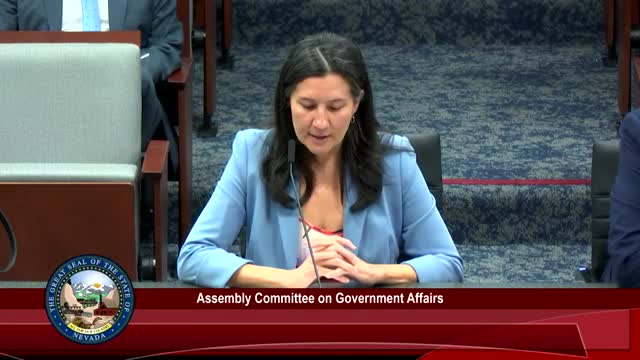Senate Bill 161 introduces expedited arbitration process for Nevada teachers
May 22, 2025 | 2025 Legislature NV, Nevada
This article was created by AI summarizing key points discussed. AI makes mistakes, so for full details and context, please refer to the video of the full meeting. Please report any errors so we can fix them. Report an error »

In a recent meeting of the Assembly Committee on Government Affairs, lawmakers discussed the implications of Senate Bill 161, which aims to reform the arbitration process for teachers in Nevada. The bill is designed to provide a more efficient and expedited arbitration process, similar to those already in place for other professions such as electricians and police officers. Currently, teachers face lengthy arbitration timelines, which can lead to disputes escalating into strikes.
One of the key points raised during the discussion was the nature of ballot initiatives, which are described as a "blunt instrument" that, once passed, cannot be modified for two legislative sessions. This rigidity can hinder necessary adjustments to laws that may need refinement after their implementation. Senate Bill 161 seeks to address this issue by allowing for a more flexible legislative approach, enabling lawmakers to adapt policies as needed.
The bill also aims to clarify existing laws regarding what constitutes strike behavior for teachers. Current statutes have been criticized for their vagueness, leading to potential misinterpretations of actions that should not be considered strike-related, such as wearing advocacy apparel or attending school board meetings. By providing clearer definitions, the legislation seeks to protect teachers from penalties for exercising their rights.
Overall, the discussions highlighted the importance of compromise in legislative processes, particularly in addressing the needs of educators while ensuring that disputes do not escalate into strikes. As the bill moves forward, it is expected to foster a more collaborative environment between teachers and school administrations, ultimately benefiting the educational landscape in Nevada.
One of the key points raised during the discussion was the nature of ballot initiatives, which are described as a "blunt instrument" that, once passed, cannot be modified for two legislative sessions. This rigidity can hinder necessary adjustments to laws that may need refinement after their implementation. Senate Bill 161 seeks to address this issue by allowing for a more flexible legislative approach, enabling lawmakers to adapt policies as needed.
The bill also aims to clarify existing laws regarding what constitutes strike behavior for teachers. Current statutes have been criticized for their vagueness, leading to potential misinterpretations of actions that should not be considered strike-related, such as wearing advocacy apparel or attending school board meetings. By providing clearer definitions, the legislation seeks to protect teachers from penalties for exercising their rights.
Overall, the discussions highlighted the importance of compromise in legislative processes, particularly in addressing the needs of educators while ensuring that disputes do not escalate into strikes. As the bill moves forward, it is expected to foster a more collaborative environment between teachers and school administrations, ultimately benefiting the educational landscape in Nevada.
View full meeting
This article is based on a recent meeting—watch the full video and explore the complete transcript for deeper insights into the discussion.
View full meeting